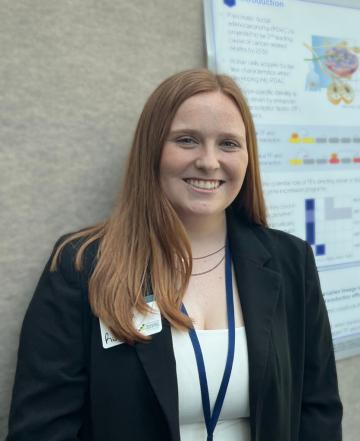Current Scholars and Projects
Project Spotlights

Jedidah Kapapula
Project Title: Anatomical Comparison of 80-Million-Year-Old Cupressaceous Fossil Shoots with Living Relatives
This project aims to describe and interpret the cellular anatomy of three-dimensionally preserved
conifer shoots from the Late Cretaceous (~80 Ma) of Antarctica. The fossils possess bifacially
flattened shoots with two different types of leaves (dimorphic leaves), a feature shared among
several members of Cupressaceae, the cypress family.
The research will involve:
1. Fossil description – Document external morphology and internal anatomy of the
fossil shoots, including leaf arrangement, vascular organization, and preservation of
tissues.
2. Comparative analysis – Examine similarities and differences between the fossils and
extant Cupressaceae taxa that possess bifacially flattened shoots. Within the modern
diversity, several cupressaceous genera contain shoots with similar morphology to the
new fossil (i.e. Callitropsis, Xanthocyparis, Thuja, Platycladus, Papuacedrus,
Austrocedrus, Libocedrus). Special attention will be given to the genera found on
Southern Hemisphere continents, as during the Cretaceous these continents were
proximal to Antarctica and are likely to share close evolutionary relationships with
the fossil.
3. Evolutionary implications – We will assess whether key features of bifacially
flattened shoots with scale leaves were present in the Late Cretaceous.
By combining paleobotanical data with modern anatomical data, this project seeks to clarify
the systematic affinities of the fossil, highlight evolutionary trends in shoot/leaf morphology, and
contribute to our understanding of ecological adaptations in Cupressaceae over deep time.
conifer shoots from the Late Cretaceous (~80 Ma) of Antarctica. The fossils possess bifacially
flattened shoots with two different types of leaves (dimorphic leaves), a feature shared among
several members of Cupressaceae, the cypress family.
The research will involve:
1. Fossil description – Document external morphology and internal anatomy of the
fossil shoots, including leaf arrangement, vascular organization, and preservation of
tissues.
2. Comparative analysis – Examine similarities and differences between the fossils and
extant Cupressaceae taxa that possess bifacially flattened shoots. Within the modern
diversity, several cupressaceous genera contain shoots with similar morphology to the
new fossil (i.e. Callitropsis, Xanthocyparis, Thuja, Platycladus, Papuacedrus,
Austrocedrus, Libocedrus). Special attention will be given to the genera found on
Southern Hemisphere continents, as during the Cretaceous these continents were
proximal to Antarctica and are likely to share close evolutionary relationships with
the fossil.
3. Evolutionary implications – We will assess whether key features of bifacially
flattened shoots with scale leaves were present in the Late Cretaceous.
By combining paleobotanical data with modern anatomical data, this project seeks to clarify
the systematic affinities of the fossil, highlight evolutionary trends in shoot/leaf morphology, and
contribute to our understanding of ecological adaptations in Cupressaceae over deep time.
Project Mentor: Brian Atikinson

Vanessa Nguyen
Project Title: Clusterin (CLU): a modulator of brain Excitatory-Inhibitory (E/I) homeostasis
Clusterin (CLU), also known as apolipoprotein J (ApoJ), is a prominent genetic risk factor for late-onset Alzheimer’s disease (AD). CLU has been extensively studied for its role in modulating amyloid-β (Aβ) dynamics, including aggregation, clearance, and transport across the blood-brain barrier—processes central to plaque formation and neuroinflammation. However, emerging evidence points to a broader role for CLU in maintaining synaptic integrity and neuronal circuit function. In Zhao’s lab, we investigated the impact of CLU loss on neuronal structure and excitatory/inhibitory (E/I) balance using a combination of immunohistochemistry and single-nucleus RNA sequencing (snRNA-seq) in wild-type (WT) and CLU knockout (CLU⁻/⁻) mice.
Our findings demonstrate that CLU deficiency leads to reduced neuronal density and significant structural disorganization in the brain. Immunostaining for MAP2 revealed marked neuronal disruption, accompanied by sex-specific alterations in VGAT and VGLUT1 expression—key markers of inhibitory and excitatory synapses, respectively. These changes were consistent with snRNA-seq data from 15-month-old male CLU⁻/⁻ mice, which revealed transcriptional signatures of hypo-excitability and disrupted synaptic signaling. Together, these data implicate CLU as a critical regulator of synaptic homeostasis, with its loss leading to imbalanced neuronal excitability and network instability.
Our results highlight a novel and essential role for CLU in preserving E/I balance and maintaining the structural and functional integrity of neural circuits. Given the centrality of these processes to cognitive function, CLU deficiency may contribute to the pathophysiology of AD through mechanisms beyond Aβ handling, including synaptic remodeling and circuit dysregulation. Ongoing studies employing Western blotting, electrophysiology, and behavioral assays aim to further elucidate the functional consequences of CLU loss, providing deeper insight into its role in neurodegeneration and identifying potential therapeutic targets for AD.
Our findings demonstrate that CLU deficiency leads to reduced neuronal density and significant structural disorganization in the brain. Immunostaining for MAP2 revealed marked neuronal disruption, accompanied by sex-specific alterations in VGAT and VGLUT1 expression—key markers of inhibitory and excitatory synapses, respectively. These changes were consistent with snRNA-seq data from 15-month-old male CLU⁻/⁻ mice, which revealed transcriptional signatures of hypo-excitability and disrupted synaptic signaling. Together, these data implicate CLU as a critical regulator of synaptic homeostasis, with its loss leading to imbalanced neuronal excitability and network instability.
Our results highlight a novel and essential role for CLU in preserving E/I balance and maintaining the structural and functional integrity of neural circuits. Given the centrality of these processes to cognitive function, CLU deficiency may contribute to the pathophysiology of AD through mechanisms beyond Aβ handling, including synaptic remodeling and circuit dysregulation. Ongoing studies employing Western blotting, electrophysiology, and behavioral assays aim to further elucidate the functional consequences of CLU loss, providing deeper insight into its role in neurodegeneration and identifying potential therapeutic targets for AD.
Project Mentor: Liqin Zhao

Maggie Ridgway
Project Title: Gene-Metal-Microbe Interactions: Investigating Heavy Metal Response and Microbiome Dynamics in Drosophila
Heavy metals like manganese, cadmium, and lead are widespread environmental contaminants that pose serious health risks to humans and animals. While some metals are essential in trace amounts, excessive exposure can disrupt biological systems and contribute to diseases. My research focuses on understanding how genetic factors and gut microbiota influence resistance to heavy metal toxicity using Drosophila melanogaster as a model organism.
In previous work, I studied a gene called pHCl-2, which encodes a chloride channel, and found that loss-of-function mutations in this gene reduce fly survival after manganese exposure, suggesting a role in metal detoxification. However, this effect did not extend to cadmium or lead, pointing to metal-specific genetic responses.
Building on this, my current project investigates how heavy metal exposure affects the composition of the gut microbiome, and whether the microbiome in turn influences host resistance to metals. I rear flies from multiple genetic backgrounds on diets supplemented with different heavy metals, then extract and sequence bacterial DNA from their guts to assess microbiome changes using 16S rRNA metagenomic techniques. I also plan to generate axenic (microbiome-free) flies from inbred strains with known resistance levels to test how the absence of microbiota alters their metal tolerance.
This project aims to reveal new insights into the complex interactions between host genetics, environmental stressors, and microbial communities. Understanding how microbiomes contribute to metal resistance may help us better grasp the biological mechanisms that maintain metal homeostasis—knowledge that could ultimately inform therapeutic strategies for managing metal toxicity in humans.
In previous work, I studied a gene called pHCl-2, which encodes a chloride channel, and found that loss-of-function mutations in this gene reduce fly survival after manganese exposure, suggesting a role in metal detoxification. However, this effect did not extend to cadmium or lead, pointing to metal-specific genetic responses.
Building on this, my current project investigates how heavy metal exposure affects the composition of the gut microbiome, and whether the microbiome in turn influences host resistance to metals. I rear flies from multiple genetic backgrounds on diets supplemented with different heavy metals, then extract and sequence bacterial DNA from their guts to assess microbiome changes using 16S rRNA metagenomic techniques. I also plan to generate axenic (microbiome-free) flies from inbred strains with known resistance levels to test how the absence of microbiota alters their metal tolerance.
This project aims to reveal new insights into the complex interactions between host genetics, environmental stressors, and microbial communities. Understanding how microbiomes contribute to metal resistance may help us better grasp the biological mechanisms that maintain metal homeostasis—knowledge that could ultimately inform therapeutic strategies for managing metal toxicity in humans.
Project Mentor: Stuart Macdonald
All Current Scholars and Projects
List of Current Scholars and Projects
| Student | Project Title | Mentor |
|---|---|---|
| Tatum Aikin | The Effect of PTPN22 Allelic Variation on Macrophage Production of Immune Cytokines | Robin Orozco |
| Parnian Arafi | PSEN-1 and APP-Mutant γ-secretase complexes stall amyloid beta peptide production | Michael S. Wolfe |
| Meghan Arias | Determining if PARP14 Restricts HSV-1 Replication in a Strain-Dependent Manner | David Davido |
| Vincent Chan | Resistance to X chromosome meiotic drive in Drosophila affinis | Rob Unckless |
| Kendall Cranor | Incorporation of Chimeric Macrodomains into Murine Hepatitis Virus (MHV) to Test Antivirals Against Multiple Coronaviruses Using a Single Viral System | Tony Fehr |
| Corbin Fairchild | Defining How Different Sulfation Patterns in the Extracellular Matrix Impact Myelin Repair in the Brain | Meredith Hartley |
| Nicole Guillen | The Effect of Partner-Cue Seeking on Acute Stress Response | Adam Smith |
| Patryk R. Hupert | Implementing a Novel All Human Triculture Model and Bioanalytical Methods to Explore Neuroinflammation | Susan Lunte |
| Jedidah Kapapula | Anatomical Comparison of 80-Million-Year-Old Cupressaceous Fossil Shoots with Living Relatives | Brian Atikinson |
| Jim Krentzel | Studying the genetics of flower symmetry using CRISPR/Cas9 gene editing | Lena Hileman |
| Leah Legleiter | Regulation of cdeAB-oprM efflux pump in Chromobacterium subtsugae in response to antibiotics and quorum sensing | Josie Chandler |
| Vanessa Nguyen | Clusterin (CLU): a modulator of brain Excitatory-Inhibitory (E/I) homeostasis | Liqin Zhao |
| Maggie Ridgway | Gene-Metal-Microbe Interactions: Investigating Heavy Metal Response and Microbiome Dynamics in Drosophila | Stuart Macdonald |
| Ariana Siddique | Permeabilization of C. elegans cuticle using gene silencing for the needle-free delivery of chemicals | Lisa Timmons |